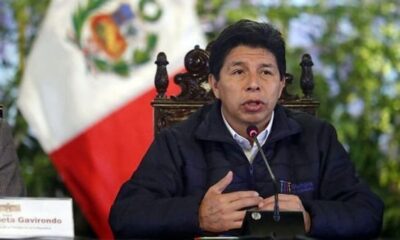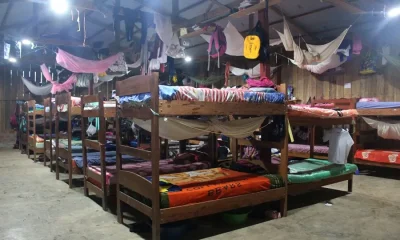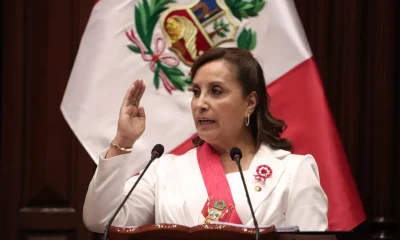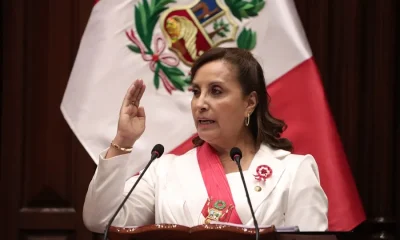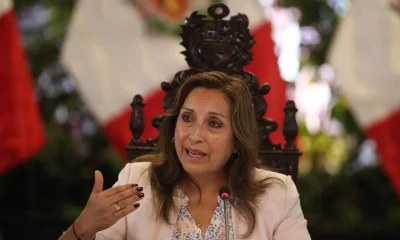International
Peru: Faced with threats, natives ask for weapons to defend their lands
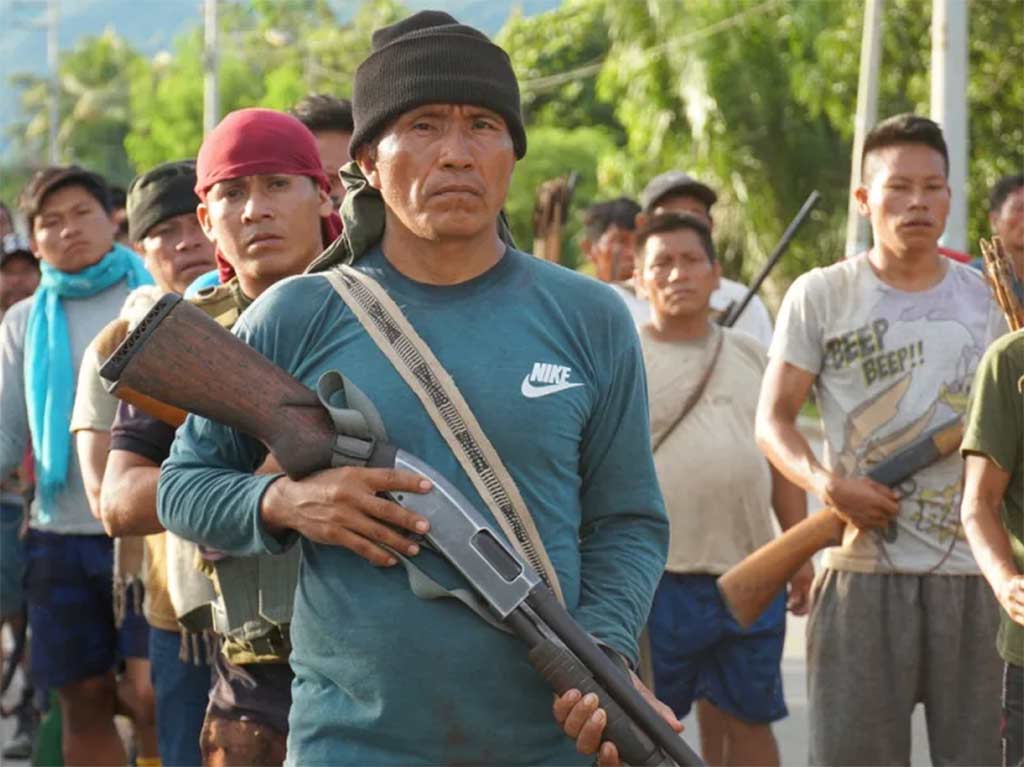
May 5 |
Two Amazonian indigenous leaders, whose territories and their own lives are threatened by drug traffickers and illegal loggers, ask the Peruvian government for weapons to defend their ancestral habitat.
The demand was presented to the foreign press by Yanet Velasco, leader of the Central de Comunidades de la etnia Asháninka del Río Ene (CARE) and Herlín Odicio Estrella, president of the Federación Nativa de Comunidades de la etnia Kakataibo, both located in the central Peruvian Amazon.
Yanet Velasco pointed out that drug traffickers and tree predators invaded areas of the territories of the 19 Asháninka communities that make up her organization, an invasion that included, she said, the murder of 20 Amazon defenders from various organizations since 2020.
It was recently announced the arrest of a suspected hitman who shot dead in April 2023 the leader Santiago Contoricó, of the Central Asháninka del Río Tambo (CART), in the region of Ucayali, bordering Brazil.
This organization repeatedly denounced that Contoricó’s life was in danger because he was receiving constant death threats from drug traffickers, without the authorities providing him with protection.
“We do not trust the police, many of them are in collusion with drug traffickers, nor do we trust the officials of the regions of Junín and Huánuco, nor the prosecutors; there is no one to turn to,” said Kakataibo leader Odicio Estrella.
Faced with this situation, the natives decided to defend themselves by organizing themselves into indigenous guards against drug traffickers and other invaders of their ancestral territories.
To do so, they only have bows, arrows and some old shotguns, so for years they have been asking the Armed Forces to provide them with more modern weaponry, but they have not received any response.
The leaders even went to the United Nations to denounce the depredation and appropriation of part of their lands and also raised the problem with Peruvian parliamentarians, without finding a solution.
They pointed out that drug and timber traffickers act in concert for the common interest of keeping native lands occupied or gaining them for their illicit activities.
As they need people to work for them and have economic power, the intruders promote the access of settlers from other regions and create fictitious population centers to legalize their presence in the habitat of the Amazonian nations.
Yanet Velasco highlights the fact that among these settlers there are criminals wanted by the police who join drug traffickers to grow coca leaf and produce cocaine, or carry out other activities such as contract killings.
They also use threats to pressure native inhabitants to also grow coca leaf, promote consumerism, and try to persuade young indigenous people to do the same in order to earn money.
The Asháninka leader pointed out that her people are interested in preserving the environment in the territory, maintaining their way of life and subsisting on fishing, hunting and the cultivation of food products, to which they add potentially exportable cacao, coffee and sesame plantations.
But to do so, they need to preserve their communally owned lands, where drug traffickers establish clandestine airstrips to transport drugs to neighboring countries such as Brazil, the platform for shipments to Europe.
Their fight also faces erroneous policies, such as the maintained and already ceased policy of programs financed by the European Union and United States cooperation, which financed alternative crops to coca grown by colonists and promoted the granting of land titles to them on lands that are part of indigenous territories.
In addition, municipal governments build roads in the middle of the jungle, with the obvious purpose of facilitating access to drug traffickers and illegal loggers.
International
Trump will receive Netanyahu at the White House next week

Israeli Prime Minister Benjamin Netanyahu will visit Washington next week, a high-ranking official of Donald Trump’s government told EFE.
The visit, which according to the specialized portal Jewish Insider will take place on Monday, comes amid pressure from Washington to achieve a ceasefire in the Gaza strip.
The US president launched a message on Sunday on his social network Truth calling for an immediate agreement to end the conflict and “release the hostages.”
This message follows another one from last Friday in which he assured that a solution to the conflict in Palestine could be reached as early as this week.
“We are working in Gaza and trying to solve it. We are supplying a lot of money and a lot of food to that area because we have to do it,” the president stressed at an event in Washington.
In addition to publicly insisting on his desire to reach a cease of hostilities in the region, Trump has also supported Netanyahu, a key ally, despite the fact that the Israeli is going through a judicial process where he is charged with bribery, fraud and breach of trust in three different criminal cases.
Israel has maintained its offensive in Gaza, in a resurgence of the conflict that has already lasted for more than a year and that leaves dozens of deaths daily.
The Israeli Army has intensified its attacks in the north of the Strip after ordering last Sunday the forced evacuation of residents in several neighborhoods of the capital of Gaza and the northern city of Yabalia.
Since October 7, 2023, at least 56,259 Palestinians have died and more than 132,000 have been injured by Israeli fire, according to figures from the Ministry of Health of the Hamas Government.
International
The US climate agency will lose access to key data for hurricane forecasting in July

The National Oceanic and Atmospheric Administration (NOAA) announced on Monday that it will lose access to essential satellite data for the hurricane forecast on July 31, when the Department of Defense will stop sharing the images with that US agency.
Initially, NOAA was going to lose access to the data from today Monday, but managed to extend the deadline since NASA, which was also going to be affected by the measure, requested an extension until July 31.
According to a NOAA statement, late on Friday, June 27, the Naval Meteorology and Oceanography Command received a request from Karen St. Germain, director of NASA’s Earth Science Division, “to postpone the withdrawal and continue processing and distributing data from the Defense Meteorological Satellite Program until July 31.”
The original decision to cut off access to satellite data as of today was made with the aim of “mitigating a significant cybersecurity risk,” according to the note.
NOAA’s access to data provided by the Defense Weather Satellite Program was crucial for predicting hurricane formation, since they allowed to mediate variables that were not available to conventional satellites.
In addition, the measure takes place in the middle of hurricane season, which experts expect to be more intense than normal in the Atlantic Ocean.
According to the Colorado State University (CSU), the probability of a major hurricane, category 3 or higher, impacting the United States in the current Atlantic cyclone season amounts to 51%.
This coincides with the approval in the Lower House of Congress of the controversial “great and beautiful bill” of US President Donald Trump, which includes a cut of almost 30% of the annual budget to NOAA and 646 million dollars to the Federal Emergency Management Agency (FEMA).
International
The Argentine justice declares Milei’s measure that limited the right to strike unconstitutional

The Justice of Argentina declared on Monday the unconstitutionality of two articles of the decree signed on May 20 by President Javier Milei that limited the right to strike of workers from various sectors, giving rise to a precautionary measure requested by the General Confederation of Labor (CGT), the main workers’ central of the country.
The decision was made by the National Labor Court No. 3, which ordered to stop the application of articles 2 and 3 of decree 340/2025, considering that they violate constitutional guarantees such as freedom of association and the right to strike, established in the Constitution and in international agreements signed by Argentina.
The decree modified article 24 of Law 25,877, which regulates collective labor conflicts, and declared a long list of activities as essential, limiting the possibility of its workers to carry out union action measures.
Judge Moira Fullana, who intervened in the case, argued that the unconstitutionality is based on the fact that, at the time of the signing of the decree, the National Congress was in full function, so there was no justification of necessity and urgency that deserved to skip the legislative treatment of such modifications.
On June 2, Fullana had provisionally failed to suspend the application of this measure, in response to another precautionary measure, requested by the Association of State Workers (ATE).
Until before its recent challenge, Decree 340/2025 required to guarantee between 50% and 75% of the usual benefits in sectors such as the production of medicines and/or hospital supplies, land and underground transport, radio and television, industrial activities, the food industry, the production and distribution of building materials, all airport services, logistics services, mining activity, refrigeration activity, mail and the distribution and marketing of food and beverages, among others, even during trade union conflicts.
The Government also included in that list of essential services all branches of maritime and river transport, customs, immigration services and education at all levels.
The measure, originally included in an extensive decree of general deregulation of the economy signed by Milei shortly after its assumption in December 2023, had already been unconstitutional by the Argentine Justice at that time.
-

 Central America4 days ago
Central America4 days agoHonduras secures IDB loan to improve access and quality of education in vulnerable areas
-

 International3 days ago
International3 days agoProtests erupt over Florida’s ‘Alligator Alcatraz’ migrant jail in the Everglades
-

 Internacionales4 days ago
Internacionales4 days agoJalisco’s grim discovery: drug cartel mass grave found in construction site
-

 International4 days ago
International4 days agoU.S. targets families of sanctioned drug traffickers with new Visa restrictions
-
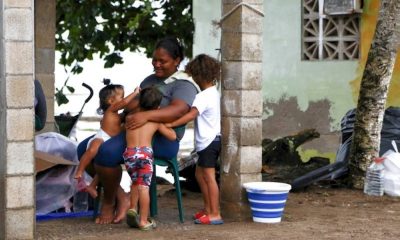
 Central America3 days ago
Central America3 days agoMigrants stranded in Panama amid US Policy crackdown and Darién gap barriers
-

 International2 days ago
International2 days agoTikTok sale advances as Trump reveals deal is in place
-

 Central America2 days ago
Central America2 days agoCastro to address FfD4 in Spain as Global Financial Reform takes center stage
-
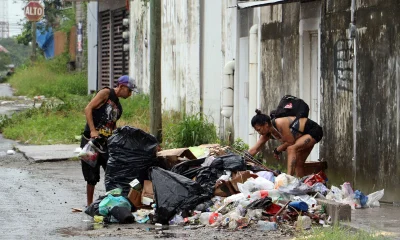
 International1 day ago
International1 day ago7 in 10 mexicans born poor stay poor, new report finds
-

 International1 day ago
International1 day agoTrump administration sues Los Angeles over sanctuary city policies
-

 International1 day ago
International1 day agoSpain hits record 46°C in June amid scorching heatwave
-

 International1 day ago
International1 day agoEcuador’s former VP Jorge Glas sentenced to 13 more years for corruption
-

 International5 hours ago
International5 hours agoThe White House insists that the United States remains in contact with Iran
-
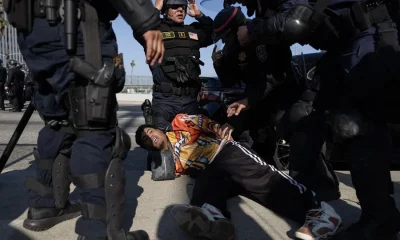
 International5 hours ago
International5 hours agoTrump sues Los Angeles for immigrant “sarture city” policies
-

 International5 hours ago
International5 hours agoThe US climate agency will lose access to key data for hurricane forecasting in July
-

 International5 hours ago
International5 hours agoFormer Correísta vice president Jorge Glas, sentenced to 13 years in prison for embezzlement in Ecuador
-

 International5 hours ago
International5 hours agoThe Argentine justice declares Milei’s measure that limited the right to strike unconstitutional
-

 International5 hours ago
International5 hours agoAn investigation by the Trump Administration concludes that Harvard violated the rights of Jewish students
-

 International5 hours ago
International5 hours agoThe US Supreme Court will address the reduction of spending limits of parties in campaigns
-

 International5 hours ago
International5 hours agoTrump will receive Netanyahu at the White House next week



















